California is the #6 least affordable state for renters
divanov // Shutterstock
California is the #6 least affordable state for renters
Full-time workers are feeling the pinch in today’s rental market. A nationwide housing shortage and skyrocketing property values—coupled with fewer pay raises for the general working population in recent decades—are fueling a squeeze in the rental market. But how affordable is rent in your state?
In order to assess affordability, Foothold Technology looked at rent and wage trends in each state and Washington D.C. based on the U.S. Department of Housing and Urban Development’s Fair Market Rent and the average renter’s wage in each state, as shown in a 2022 analysis from the National Low Income Housing Coalition. The 12 least affordable states on the national list are ranked based on the number of jobs needed at an average renter’s wage to afford a modest two-bedroom unit.
HUD’s Fair Market Rent metric is usually set at the 40th percentile of rent for typical units—meaning slightly below the average rent in a given metro area. It excludes low-quality, already subsidized, and recently built units. And in the case of the NLIHC analysis, “affordable” is used to describe monthly rental rates that equate to 30% or less of a renter’s income.
Today, a renter in the U.S. needs to make $25.82 an hour, up from $24.90 last year, in order to afford rent for a modest two-bedroom apartment, according to the NLIHC. If the renter needs just one bedroom of space, they will need to earn $21.25 per hour on average.
California by the numbers
– Jobs at average renter’s wage needed to afford a 2-bedroom: 1.3
– Monthly rent affordable at average renter’s wage: $1,580
– Most expensive area in the state (per housing wage): San Francisco
– Least expensive area in the state (per housing wage): Bakersfield
California ranks #6 in terms of states that are most difficult for renters to afford housing. The average renter earns $30 an hour, the highest of any other state in the top 12 least affordable for renters. Still, a shortage of housing stock and the popularity of the Golden State has meant higher rents for the last several decades. A worker has to juggle more than one job in California to afford a moderately priced two-bedroom rental.
In 49 states, along with Washington D.C. and Puerto Rico, the average renter working full time doesn’t earn enough to afford HUD’s definition of a moderately priced rental apartment. North Dakota, which has enjoyed an oil and gas related boom for the last several years, is the only state that breaks this mold, according to the 2021 NLIHC report. In almost every state in the U.S., median household incomes haven’t kept up with the rate at which the median rent has risen, from the turn of the century through 2018. That’s according to a report from the Center on Budget and Policy Priorities cited by the NLIHC.
A total of 20 states still lack a state-level minimum wage law exceeding the federal level, allowing businesses to legally pay as little as $7.25 per hour for labor, which is the federal minimum wage. A person earning the federal minimum wage would need to work more than two full-time jobs each week to afford a modest two-bedroom rental unit. The federal minimum wage does not increase with inflation, and the last time it was raised was over 13 years ago. But it’s far from just the lowest-paid Americans who find the cost of living too high.
The average renter makes an hourly wage of $21.99, according to the 2022 NLIHC analysis of BLS data. About 5.8% of adults in the U.S. were considered housing insecure in May 2022, the most recent month for which the U.S. Census Bureau has published data on the portion of Americans behind on their rent or mortgage payments and who have little to no confidence they can pay next month’s bill. Housing insecurity was highest in New York, Mississippi, and Louisiana.
Meanwhile, rent prices are being driven to record levels across the country. Contributing to the increases are a shortage of available housing, including both single-family homes and multifamily apartment complexes. Landlords have also cited the increasing costs of maintaining properties as a reason for rising rents. Since early 2021, the median rent in the U.S. has ballooned from around $1,500 to $1,879 in July 2022, according to Realtor.com data. It was the 17th month straight for which median rents set a record.
Keep reading to see which states are the least affordable for renters.
Least affordable states for renters
#1. Hawaii: 2 jobs needed at average renter’s wage to afford a 2-bedroom
#2. Massachusetts: 1.4 jobs needed at average renter’s wage to afford a 2-bedroom
#3. Rhode Island: 1.4 jobs needed at average renter’s wage to afford a 2-bedroom
#4. Vermont: 1.4 jobs needed at average renter’s wage to afford a 2-bedroom
#5. Maine: 1.4 jobs needed at average renter’s wage to afford a 2-bedroom
![]()
